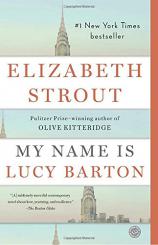Excerpt
Excerpt
My Name Is Lucy Barton

There was a time, and it was many years ago now, when I had to stay in a hospital for almost nine weeks. This was in New York City, and at night a view of the Chrysler Building, with its geometric brilliance of lights, was directly visible from my bed. During the day, the building’s beauty receded, and gradually it became simply one more large structure against a blue sky, and all the city’s buildings seemed remote, silent, far away. It was May, and then June, and I remember how I would stand and look out the window at the sidewalk below and watch the young women—my age—in their spring clothes, out on their lunch breaks; I could see their heads moving in conversation, their blouses rippling in the breeze. I thought how when I got out of the hospital I would never again walk down the sidewalk without giving thanks for being one of those people, and for many years I did that—I would remember the view from the hospital window and be glad for the sidewalk I was walking on.
To begin with, it was a simple story: I had gone into the hospital to have my appendix out. After two days they gave me food, but I couldn’t keep it down. And then a fever arrived. No one could isolate any bacteria or figure out what had gone wrong. No one ever did. I took fluids through one IV, and antibiotics came through another. They were attached to a metal pole on wobbly wheels that I pushed around with me, but I got tired easily. Toward the beginning of July, whatever problem had taken hold of me went away. But until then I was in a very strange state—a literally feverish waiting—and I really agonized. I had a husband and two small daughters at home; I missed my girls terribly, and I worried about them so much I was afraid it was making me sicker. When my doctor, to whom I felt a deep attachment—he was a jowly-faced Jewish man who wore such a gentle sadness on his shoulders, whose grandparents and three aunts, I heard him tell a nurse, had been killed in the camps, and who had a wife and four grown children here in New York City—this lovely man, I think, felt sorry for me, and saw to it that my girls—they were five and six—could visit me if they had no illnesses. They were brought into my room by a family friend, and I saw how their little faces were dirty, and so was their hair, and I pushed my IV apparatus into the shower with them, but they cried out, “Mommy, you’re so skinny!” They were really frightened. They sat with me on the bed while I dried their hair with a towel, and then they drew pictures, but with apprehension, meaning that they did not interrupt themselves every minute by saying, “Mommy, Mommy, do you like this? Mommy, look at the dress of my fairy princess!” They said very little, the younger one especially seemed unable to speak, and when I put my arms around her, I saw her lower lip thrust out and her chin tremble; she was a tiny thing, trying so hard to be brave. When they left I did not look out the window to watch them walk away with my friend who had brought them, and who had no children of her own.
My husband, naturally, was busy running the household and also busy with his job, and he didn’t often have a chance to visit me. He had told me when we met that he hated hospitals—his father had died in one when he was fourteen—and I saw now that he meant this. In the first room I had been assigned was an old woman dying next to me; she kept calling out for help—it was striking to me how uncaring the nurses were, as she cried that she was dying. My husband could not stand it—he could not stand visiting me there, is what I mean—and he had me moved to a single room. Our health insurance didn’t cover this luxury, and every day was a drain on our savings. I was grateful not to hear that poor woman crying out, but had anyone known the extent of my loneliness I would have been embarrassed. Whenever a nurse came to take my temperature, I tried to get her to stay for a few minutes, but the nurses were busy, they could not just hang around talking.
About three weeks after I was admitted, I turned my eyes from the window late one afternoon and found my mother sitting in a chair at the foot of my bed. “Mom?” I said.
“Hi, Lucy,” she said. Her voice sounded shy but urgent. She leaned forward and squeezed my foot through the sheet. “Hi, Wizzle,” she said. I had not seen my mother for years, and I kept staring at her; I could not figure out why she looked so different.
“Mom, how did you get here?” I asked.
“Oh, I got on an airplane.” She wiggled her fingersand I knew that there was too much emotion for us. So I waved back, and lay flat. “I think you’ll be all right,” she added, in the same shy-sounding but urgent voice. “I haven’t had any dreams.”
My Name Is Lucy Barton
- Genres: Fiction, Women's Fiction
- paperback: 240 pages
- Publisher: Random House Trade Paperbacks
- ISBN-10: 0812979524
- ISBN-13: 9780812979527



